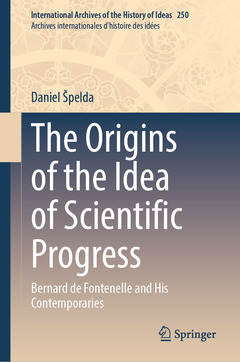The Origins of the Idea of Scientific Progress, 2024 Bernard de Fontenelle and His Contemporaries International Archives of the History of Ideas Archives internationales d'histoire des idées Series, Vol. 250
Auteur : Špelda Daniel

This volume offers a new interpretation of the genesis of the idea of scientific progress in early modern science and philosophy. The interpretation argues that the idea of scientific progress was not a historical category, but an epistemological one. The main thesis of the book posits that the idea of scientific progress was a methodological means of dealing with the contingency of nature. To illustrate the novelty of the idea, the individual chapters compare several features of Renaissance natural philosophy with a new regime of knowledge that included time as an inevitable factor of empirical research. The temporal regime of knowledge is illustrated by the work of Bernard de Fontenelle and his colleagues at the Académie des sciences in Paris at the end of the 17th century. The new interpretation remedies a gap in recent scholarship where the idea of scientific progress has been overlooked even though the early modern natural philosophers themselves used it to describe the nature of their research. The book places both well-known texts and less-studied documents in a new light, thus contributing to the lively and rich debate on the origins and nature of early modern science and philosophy. It is of interest to scholars studying the history of early modern philosophy and science.
Chapter 1. The Concept of Progress.- Chapter 2. Teleology and Contingency.- Chapter 3. The End of Contemplator Caeli.- Chapter 4. The Temporal Regime of Knowledge.- Chapter 5. Ars Longa, vita Brevis: The Collectivization of Knowledge.- Chapter 6. Progress of the Human Spirit.
Daniel Špelda works as a professor at the Department of Philosophy in the Faculty of Arts at Masaryk University in Brno (Czech Republic). In his research, he has concentrated on the philosophical problems, concepts, and categories that played a role in the development of early modern science, including curiosity, teleology, progress, and the centre of the universe. In recent years, he has addressed the question of how the early modern natural philosophers understood the history of their field and their position in the course of cultural history.
Date de parution : 06-2024
Ouvrage de 224 p.
15.5x23.5 cm
